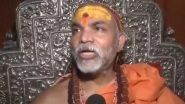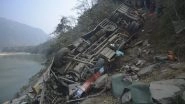Goma (DR Congo), Nov 28 (AFP) Four Ebola workers in eastern DR Congo were killed and six injured, adding to the toll of people who have died fighting the nearly 16-month-old epidemic, the UN said Thursday.
A member of the vaccination team and two drivers were killed at an Ebola workers' accommodation camp in Biakato Mines in Ituri province, the World Health Organization (WHO) said.
The attack occurred two kilometres (one mile) from a temporary base used by UN peacekeepers, one of whom was injured in an operation to repel the assailants, the UN said.
A second attack claimed the life of a police guard at an Ebola coordination office in Mangina, a few dozen kilometres (miles) away in North Kivu province.
"We are heartbroken that people have died in the line of duty as they worked to save others," said WHO chief Tedros Adhanom Ghebreyesus.
"The world has lost brave professionals," he said, quoted in a WHO statement issued in Geneva.
Michael Ryan, WHO director of emergency operations, said that after the attack all staff were moved from Biakato Mines to Goma, one of the main cities in the region.
There was no immediate claim for the attacks, which DR Congo's national coordinator for Ebola, Dr. Jean-Jacques Muyembe, said occurred "almost simultaneously, around midnight."
Ryan said that he knew of "no specific intelligence regarding an imminent attack" at Biakato Mines.
None of the dead were WHO staff but a worker with the UN agency was injured, Ryan said.
An outbreak of the much-feared haemorrhagic virus has killed 2,199 in North and South Kivu and Ituri provinces since August 1, 2018, according to the latest official figures.
It is the Democratic Republic of Congo's 10th Ebola epidemic and the second deadliest on record after an outbreak that struck West Africa in 2014-16, claiming more than 11,300 lives.
Mangina is the historic starting point of the epidemic. UN Secretary General Antonio Guterres visited the town on September 1.
Insecurity has complicated the epidemic from the outset, compounding resistance within communities to preventive measures, care facilities and safe burials.
On November 4, the authorities said more than 300 attacks on Ebola health workers had been recorded since the start of the year, leaving six dead and 70 wounded, some of them patients.
The WHO said that last week, seven cases of Ebola had been recorded, compared with the peak of more than 120 per week in April 2019.
"Ebola was retreating. These attacks will give it force again, and more people will die as a consequence," Tedros warned.
"It will be tragic to see more unnecessary suffering in communities that have already suffered so much. We call on everyone who has a role to play to end this cycle of violence." Vast tracts of eastern DRC are in the grip of armed groups, especially a shadowy militia called the Allied Democratic Forces (ADF).
The armed forces launched an offensive in the region on October 30, prompting a wave of massacres of civilians by suspected ADF men.
Ninety-nine people have been killed by armed groups in the Beni area alone since November 5, according to the not-for-profit Congo Research Group (CRG).
The bloodshed has sparked a wave of anger at the authorities and the UN mission in the DRC, MONUSCO. Seven people have died in protests since Saturday.
The latest deaths sparked an immediate reaction Thursday in Beni, where many responders kept a low profile and vaccination teams were not at work, AFP journalists saw.
"A suspected case of Ebola has been reported from the health centre. The investigator has gone there quietly on foot to avoid drawing attention," said Michel Kalongo, a local doctor involved in the anti-Ebola fight.
Normally, an ambulance would have been despatched to conduct tests. But responders on Thursday did not wear their uniforms, nor did they openly display their medical kits.
"We are blending in with ordinary motorcyclists to avoid public anger," said Timothee Pothsola, a motorbike driver who transports Ebola teams.
Pierre Vernier of the medical charity MSF (Doctors Without Borders) said, "Because of the lack of security, lab work is problematic. It's hard to gather samples." But, he said, "the real problem is that Ebola monitoring teams cannot carry out work on the ground" to follow up cases where people may have been exposed to the virus.
"Part of the personnel have been evacuated... only veterans who are used to tense situations like this have stayed behind." (AFP)
(The above story is verified and authored by Press Trust of India (PTI) staff. PTI, India’s premier news agency, employs more than 400 journalists and 500 stringers to cover almost every district and small town in India.. The views appearing in the above post do not reflect the opinions of LatestLY)













 Quickly
Quickly


